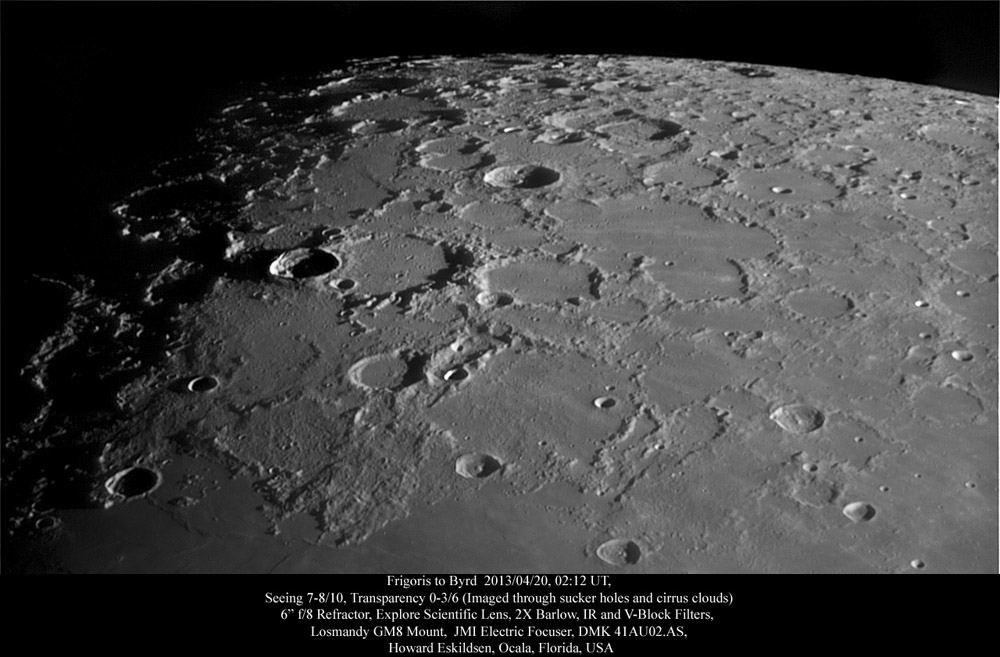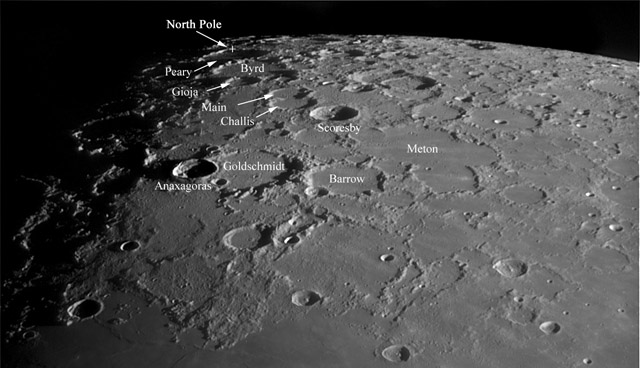Difference between revisions of "May 17, 2013"
| Line 3: | Line 3: | ||
<!-- ws:start:WikiTextHeadingRule:0:<h1> --> | <!-- ws:start:WikiTextHeadingRule:0:<h1> --> | ||
<!-- ws:start:WikiTextLocalImageRule:14:<img src="/file/view/LPOD-May17-13.jpg/432237562/LPOD-May17-13.jpg" alt="" title="" /> -->[[File:LPOD-May17-13.jpg|LPOD-May17-13.jpg]]<!-- ws:end:WikiTextLocalImageRule:14 --><br /> | <!-- ws:start:WikiTextLocalImageRule:14:<img src="/file/view/LPOD-May17-13.jpg/432237562/LPOD-May17-13.jpg" alt="" title="" /> -->[[File:LPOD-May17-13.jpg|LPOD-May17-13.jpg]]<!-- ws:end:WikiTextLocalImageRule:14 --><br /> | ||
| − | <em>image by [mailto:howardeskildsen@msn.com | + | <em>image by [mailto:howardeskildsen@msn.com Howard Eskildsen]</em><br /> |
<table class="wiki_table"> | <table class="wiki_table"> | ||
<tr> | <tr> | ||
| Line 10: | Line 10: | ||
<td>At first, the northern portion of the Moon appears battered and confusing, but finding just a few key craters can bring order to the chaos and lead the observer to the lunar North Pole. Battered Barrow lies between Goldschmidt and the mega-complex, Meton. Beyond Barrow, the fresh crater Scoresby leads the way to the pole with steps through Challis, Main, Byrd, and finally Peary. The pole lies on the upper rim of Peary in this image, and the highlands visible between the pole and the upper margin of the image mark the region that I like to refer to as "south of north." Once you visualize the northern trail of craters that lead to the pole, it becomes easy to get your bearings in the north polar region. Notice the shadowed Anaxagoras on the western margin of Goldschmidt and Gioja (pronounced Geo-ee´-a). Anaxagoras is a young crater with rays extending across the mid-portion of the photo, while Gioja is another tired, worn crater clinging to the margin of Byrd.<br /> | <td>At first, the northern portion of the Moon appears battered and confusing, but finding just a few key craters can bring order to the chaos and lead the observer to the lunar North Pole. Battered Barrow lies between Goldschmidt and the mega-complex, Meton. Beyond Barrow, the fresh crater Scoresby leads the way to the pole with steps through Challis, Main, Byrd, and finally Peary. The pole lies on the upper rim of Peary in this image, and the highlands visible between the pole and the upper margin of the image mark the region that I like to refer to as "south of north." Once you visualize the northern trail of craters that lead to the pole, it becomes easy to get your bearings in the north polar region. Notice the shadowed Anaxagoras on the western margin of Goldschmidt and Gioja (pronounced Geo-ee´-a). Anaxagoras is a young crater with rays extending across the mid-portion of the photo, while Gioja is another tired, worn crater clinging to the margin of Byrd.<br /> | ||
<br /> | <br /> | ||
| − | <em>[mailto:tychocrater@yahoo.com | + | <em>[mailto:tychocrater@yahoo.com Chuck Wood]</em><br /> |
<br /> | <br /> | ||
<strong>Related Links</strong><br /> | <strong>Related Links</strong><br /> | ||
Revision as of 18:04, 11 January 2015
Steps To the Pole

image by Howard Eskildsen
 |
At first, the northern portion of the Moon appears battered and confusing, but finding just a few key craters can bring order to the chaos and lead the observer to the lunar North Pole. Battered Barrow lies between Goldschmidt and the mega-complex, Meton. Beyond Barrow, the fresh crater Scoresby leads the way to the pole with steps through Challis, Main, Byrd, and finally Peary. The pole lies on the upper rim of Peary in this image, and the highlands visible between the pole and the upper margin of the image mark the region that I like to refer to as "south of north." Once you visualize the northern trail of craters that lead to the pole, it becomes easy to get your bearings in the north polar region. Notice the shadowed Anaxagoras on the western margin of Goldschmidt and Gioja (pronounced Geo-ee´-a). Anaxagoras is a young crater with rays extending across the mid-portion of the photo, while Gioja is another tired, worn crater clinging to the margin of Byrd.
|



